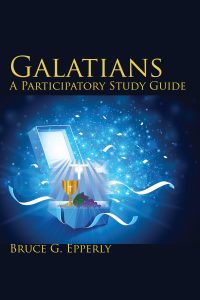Freedom and Responsibility
I posted an extract from Dave Black’s blog on The Jesus Paradigm today. (I do this because you can’t link to a specific post on Dave’s blog, and I have his permission.) Dave is talking about Galatians 5:13-15, and what freedom means.
Rather than commenting on this passage myself, I want to put a quote from one of my other authors alongside Dave’s. I like to do this both in terms of seeing where we disagree, but also to note where we might come from different denominations and/or tradition streams, and nonetheless agree.
This is from Galatians: A Participatory Study Guide by Bruce Epperly:
We are called to freedom, Paul proclaims. Many people believe that freedom means doing exactly what they want without regard to its impact on others. In individualistic North America, we hear the following cries of freedom: “It’s my money and I can do whatever I want with it,” “It’s a woman’s choice,” “It’s my property and I will use it as I please,” “Don’t infringe on my right to gun ownership,” “It’s not hurting anyone, I can do what I want in my private life.” Paul sees Christian freedom from a very different perspective.
Freedom finds its fullest expression in loving relationships that take into consideration the needs of others. Christian freedom is not coercive, it is invitational, and it invites us to let go of our individualistic possessiveness and live in light of God’s grace and generosity, manifest in our willingness to sacrifice some aspects of our freedom for the well-being of others and the communities of which we are a part.
“Do not use your freedom as an opportunity for self-indulgence, but through love become slaves to one another” (5:13). Freedom involves responsibilities as well as rights. In fact, in Christian community, Paul asserts that freedom involves sacrifice for the greater good of those around me. Paul’s understanding of freedom within the Christian community is captured in his Letter to the Romans: “I know and am persuaded in the Lord Jesus that nothing is unclean in itself; but it is unclean for anyone who thinks it unclean. If your brother or sister is being injured by what you eat, you are no longer walking in love. Do not let what you eat cause the ruin of one for whom Christ died” (Romans 14:14-15). True freedom goes beyond self-interest to embrace the best interests of those with whom we interact.
Epperly, Galatians, 57-58
I find that a critical element of my Bible study is to consult a variety of sources, not just different theological positions, but also different approaches. In my current study of Romans, for example, I follow a theological commentary, an exegetical commentary (from a different perspective), and a linguistic/technical commentary.


